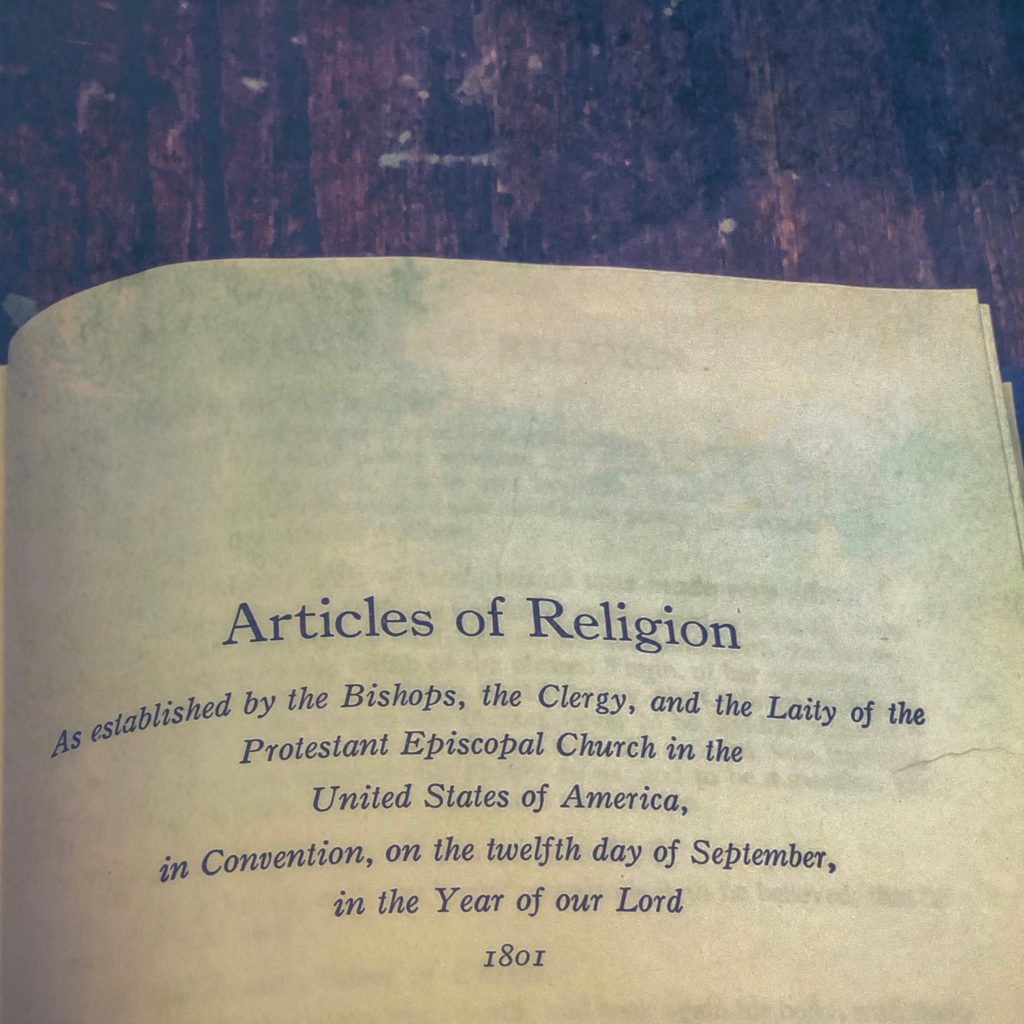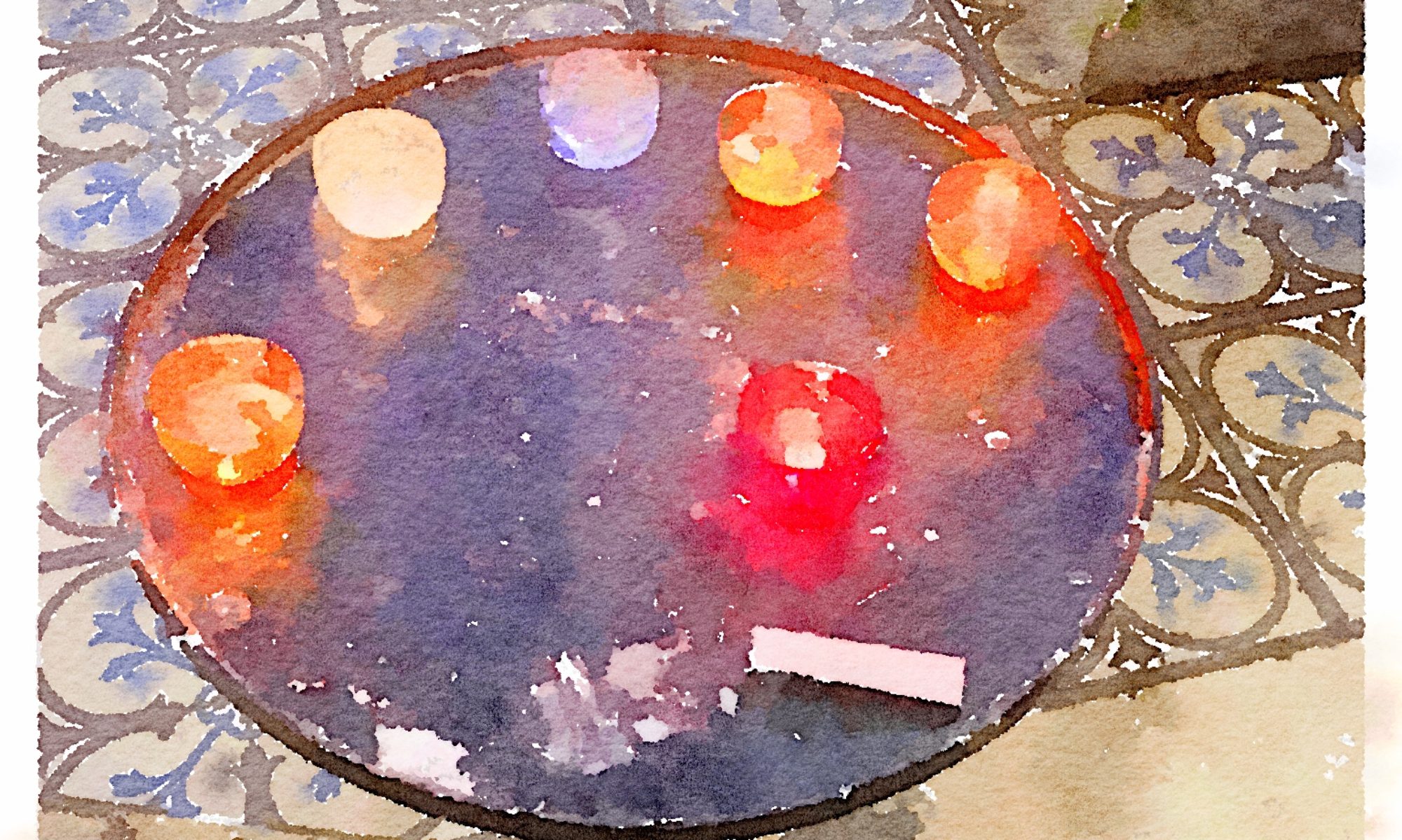
Sacraments ordained of Christ be not only badges or tokens of Christian men’s profession, but rather they be certain sure witnesses, and effectual signs of grace, and God’s good will towards us, by the which he doth work invisibly in us, and doth not only quicken, but also strengthen and confirm our Faith in him.
There are two Sacraments ordained of Christ our Lord in the Gospel, that is to say, Baptism, and the Supper of the Lord.
Those five commonly called Sacraments, that is to say, Confirmation, Penance, Orders, Matrimony, and Extreme Unction, are not to be counted for Sacraments of the Gospel, being such as have grown partly of the corrupt following of the Apostles, partly are states of life allowed in the Scriptures, but yet have not like nature of Sacraments with Baptism, and the Lord’s Supper, for that they have not any visible sign or ceremony ordained of God.
The Sacraments were not ordained of Christ to be gazed upon, or to be carried about, but that we should duly use them. And in such only as worthily receive the same, they have a wholesome effect or operation: but they that receive them unworthily, purchase to themselves damnation, as Saint Paul saith.”
by Lucas C. Crossland
The word ‘sacrament’ derives from the Latin meaning sacred and the Greek meaning mystery. If we put two and two together, then we have to say that a sacrament is a sacred mystery. It is something that has an infinite depth of meaning that, if we try to uncover, we may only scratch the surface, but it is worth trying.
The Catechism in the the 1979 Book of Common Prayer tells us three things about the sacraments:
“Q. What are the sacraments?
A. The sacraments are outward and visible signs of inward and spiritual grace, given by Christ as sure and certain means by which we receive that grace.
Q. What is grace?
A. Grace is God’s favor towards us, unearned and undeserved; by grace God forgives our sins, enlightens our minds, stirs our hearts, and strengthens our wills.
Q. What are the two great sacraments of the Gospel?
A. The two great sacraments given by Christ to his church are Holy Baptism and the Holy Eucharist.”
(p.857-858).
Bearing these questions and answers in mind, we must now examine the “two great sacraments of the Gospel.”
In Baptism, we are united to Christ in his death and resurrection, sealed by the Spirit, adopted by God thus becoming members of Christ’s body, and, in turn, we become heirs to the Kingdom. The 1979 prayer book puts it this way, “Holy Baptism is the sacrament by which God adopts us as his children and makes us members of Christ’s body, the Church, and inheritors of the Kingdom of God The outward sign of Baptism is water, and the inward grace is unity with Christ, new birth, forgiveness of sins, and new life” (p. 858).
Baptism is demanding, and it requires daily effort for the Christian. In Baptism, Christ’s identity becomes ours. This sacrament requires grace to sustain us in this new identity. In a homily given to early Christians in Jerusalem, Cyril says, “it is right to call you ‘Christs’ or anointed ones… You have become ‘Christs’ by receiving the sign of the Holy Spirit…When you emerged from the pool of sacred waters you were anointed in a manner corresponding to Christ’s anointing.” Because we have become “anointed ones” at our baptism, we have a responsibility. We need only look at the covenant we made at Baptism: to reject evil, to accept Jesus as our savior, to love others as ourselves, and to seek justice and peace among everyone, not just those we like. The prophet Isaiah puts it this way “I have given you as a covenant to the people, a light to the nations, to open the eyes that are blind, to bring out the prisoners from the dungeon, from the prison those who sit in darkness” (42: 6-7). There is no undoing the covenant because it is both part of our identity as God’s Beloved and our union with Christ. Because of our Baptism, we are all God’s children, God’s Beloved. St. Hilary reminds us, “Everything that happened to Christ lets us know that, after the bath of water, the Holy Spirit swoops down upon us from high heaven and that, adopted by the Father’s voice, we become [children] of God” (Catechism of the Catholic Church 537).
Our Baptism stems from Christ’s baptism. I’m sure we all can remember the story, but the most important part is this: “This is my son, the beloved, with whom I am well pleased” (Matthew 13:16-17). Our work begins with baptism, not ends. Acts tells us, “he went about doing good and healing all who were oppressed by the devil, for God was with him” (10:38). Matthew echoes Acts, “Then Jesus was led by the Spirit” (4:1). And the Spirit as Isaiah tells us “brings justice to the nations” (42:1). Baptism for us is also the beginning–it is not a thing of the past but a daily dying to sin and living into the “risen life of Jesus Christ our Savior” (Book of Common Prayer p. 307).
If we examine our lives through the lens of our baptism, then we should not have to fear St. Paul’s warning of eating and drinking judgement against ourselves (1 Cor. 11:29).
The grace given to us at Baptism is sustained by frequent reception of Holy Communion, for it is on these two great sacraments, given by Christ, that our salvation depends.
Again, a good place that defines the Holy Eucharist is the Catechism:
“Q. What is the Holy Eucharist?
A. The Holy Eucharist is the sacrament commanded by Christ for the continual remembrance of his life, death, and resurrection, until his coming again.
Q. What is the outward and visible sign in the Eucharist?
A. The outward and visible sign in the Eucharist is bread and wine, given and received according to Christ’s Command.
Q. What is the inward and spiritual grace given in the Eucharist?
A. The inward and spiritual grace in the Holy Communion is the Body and Blood of Christ given to his people, and received by faith.
Q. What are the benefits which we receive in the Lord’s Supper?
A. The benefits we receive are the forgiveness of our sins, the strengthening of our union with Christ and one another, and the foretaste of the heavenly banquet which is our nourishment in eternal life”
(p. 859-860).
Paul tells us, “For I received from the Lord what I also handed onto you, that the Lord Jesus on the night when he was betrayed took a loaf of bread, and when he had given thanks, he broke it and said, ‘This is my body that is for you. Do this in remembrance of me.’ In the same way he took the cup also, after supper, saying, ‘This cup is the new covenant in my blood. Do this, as often as you drink it, in remembrance of me.’ For as often as you eat this bread and drink this cup, you proclaim the Lord’s death until he comes” (1 Cor. 11:23-26). The Eucharist then is something given to us by Christ himself, “a perpetual memory of that his precious death and sacrifice, until his coming again” (BCP p.334). The Eucharist is our “sacrifice of praise and thanksgiving.”
It is the risen body of Christ that we experience in the Eucharist, for that is how the early disciples experienced him as well. Our encounter with Christ in the Lord’s Supper is a resurrection experience. Everytime we gather as the Body of Christ, we experience Christ’s risen presence among us as well as in the Eucharistic bread and wine. In her book, Life in Christ, Julia Gatta explains our encounter of Christ in the Liturgy this way,
Over the centuries, and despite wide variation in language and culture, the structure of the eucharistic liturgy has remained fundamentally the same. There is the Liturgy of the Word, followed by the Liturgy of the Sacrament. Christ’s risen presence suffuses the entire rite. He is present in the gathered community, for the Church is the Body of Christ. He speaks to us through the scriptural lessons and through the proclamation of the gospel. His Holy Spirit animates our intercessions. Above all, we offer the Eucharistic Prayer-the Great Thanksgiving- ‘by him and with him and in him.’ And like the disciples at Emmaus, we know him with compelling vividness in the breaking of bread, as Jesus takes, blesses, breaks, and gives us that bread which is his very self. In Holy Communion we are united with him and with one another, constituted once again as the Body of Christ. (p. 41)
God has given us this most wonderful sacrament that we may always “perceive in ourselves the fruit of redemption” (Book of Common Prayer p. 834).
The 1979 Book of Common Prayer clearly makes a distinction between Baptism and Holy Eucharist and the other five “Sacramental Rites,” confirmation, ordination, holy matrimony, reconciliation of a penitent, and unction. The Prayerbook makes this distinction because of its original definition of a sacrament with a clear exception, “given by Christ.” While the other five rites are means of grace, they are not necessary for every person, nor are they given to us by Christ, but are given to us through Tradition (ex. marriage and ordination). Baptism and the Supper of the Lord follow the definition of the prayerbook wholly in that they are “given by Christ as sure and certain means by which we receive that grace.”
Lucas C. Crossland lives in Sewanee, TN where he manages grants for a local non-profit. He holds a B.A. in Religious Studies from the University of the South in Sewanee, TN.
